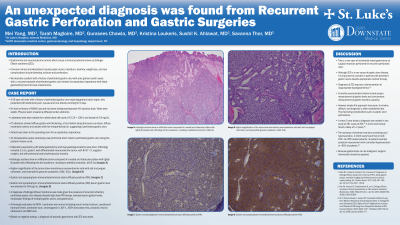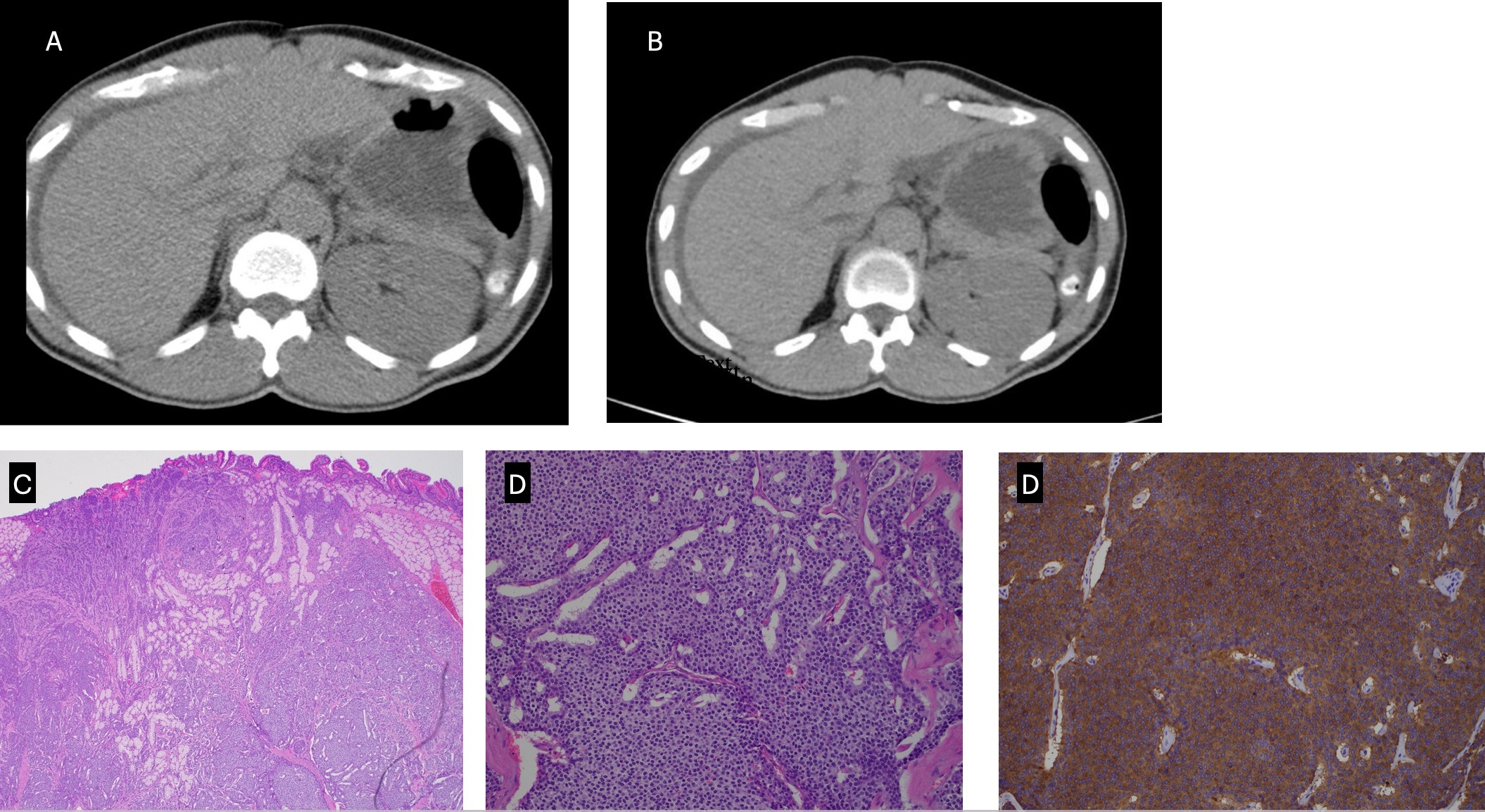Monday Poster Session
Category: Stomach
P3397 - An Unexpected Diagnosis was Found From Recurrent Gastric Perforation and Gastric Surgeries
Monday, October 28, 2024
10:30 AM - 4:00 PM ET
Location: Exhibit Hall E

- MY
Mei Yang, MD
St. Luke's Hospital
Chesterfield, MO
Presenting Author(s)
Mei Yang, MD1, Tarah Magloire, MD2, Gurasees Chawla, MD2, Kristina Loukeris, MD2, Savanna Thor, DO, MPH2, Sushil Ahlawat, MD, MS, MBBS2
1St. Luke's Hospital, Chesterfield, MO; 2SUNY Downstate Health Sciences University, Brooklyn, NY
Introduction: Gastrinomas are neuroendocrine tumors which cause a clinical syndrome known as Zollinger-Ellison syndrome (ZES). Common clinical manifestations include peptic ulcers, heartburn, diarrhea, weight loss, and rare complications include bleeding, stricture and perforation. We describe a patient with a history of perforated gastric ulcer with prior graham patch repair, with a recurrent episode of perforated gastric ulcer treated via exploratory laparotomy with distal gastrectomy found to have a Gastrinoma.
Case Description/Methods: A 58 year old male with a history of perforated gastric ulcer requiring graham patch repair, who presented with abdominal pain, nausea and non-bloody vomiting for 5 days. He had no history of NSAID use and had been taking esomeprazole 40 mg twice daily. Vitals were stable. Physical exam revealed a diffusely tender abdomen. Laboratory tests were notable for a white blood cell count of 15.26 × 109/L and lactate of 3.9 mg/dL. CT abdomen showed diffuse gastric wall thickening, a focal defect along the lesser curvature, diffuse mesenteric edema and ascites with free intraperitoneal air, suggesting a perforated gastric ulcer. Patient was taken to the operating room for an exploratory laparotomy. An intraoperative upper endoscopy was performed which noted a perforated gastric ulcer along the posterior lesser curve. Exploratory laparotomy with distal gastrectomy and loop gastrojejunostomy were done. Pathology revealed a 2 cm, grade 1 well-differentiated neuroendocrine tumor, with Ki-67 < 3, negative margins, but with perineural and lymphovascular invasion. Serum gastrin level was elevated to 364 pg/mL. A diagnosis of Zollinger-Ellison Syndrome was made given the presence of recurrent refractory perforated peptic ulcer disease despite high dose PPI therapy, elevated serum gastrin levels, endoscopic findings of multiple gastric ulcers, and gastrinoma. A thorough evaluation for MEN 1 syndrome was normal including serum ionized calcium, parathyroid hormone levels, octreotide scan, chromogranin A, IGF-1, ACTH stimulation test, prolactin, thyroid ultrasound, and MRI brain. Based on negative workup, a diagnosis of sporadic gastrinoma with ZES was made.
Discussion: This is a rare case of incidentally noted gastrinoma on surgical resection performed for recurrent perforated ulcer. Although ZES is a rare cause of peptic ulcer disease, it is important to consider in patients with persistent gastric ulcers despite appropriate medical therapy.

Disclosures:
Mei Yang, MD1, Tarah Magloire, MD2, Gurasees Chawla, MD2, Kristina Loukeris, MD2, Savanna Thor, DO, MPH2, Sushil Ahlawat, MD, MS, MBBS2. P3397 - An Unexpected Diagnosis was Found From Recurrent Gastric Perforation and Gastric Surgeries, ACG 2024 Annual Scientific Meeting Abstracts. Philadelphia, PA: American College of Gastroenterology.
1St. Luke's Hospital, Chesterfield, MO; 2SUNY Downstate Health Sciences University, Brooklyn, NY
Introduction: Gastrinomas are neuroendocrine tumors which cause a clinical syndrome known as Zollinger-Ellison syndrome (ZES). Common clinical manifestations include peptic ulcers, heartburn, diarrhea, weight loss, and rare complications include bleeding, stricture and perforation. We describe a patient with a history of perforated gastric ulcer with prior graham patch repair, with a recurrent episode of perforated gastric ulcer treated via exploratory laparotomy with distal gastrectomy found to have a Gastrinoma.
Case Description/Methods: A 58 year old male with a history of perforated gastric ulcer requiring graham patch repair, who presented with abdominal pain, nausea and non-bloody vomiting for 5 days. He had no history of NSAID use and had been taking esomeprazole 40 mg twice daily. Vitals were stable. Physical exam revealed a diffusely tender abdomen. Laboratory tests were notable for a white blood cell count of 15.26 × 109/L and lactate of 3.9 mg/dL. CT abdomen showed diffuse gastric wall thickening, a focal defect along the lesser curvature, diffuse mesenteric edema and ascites with free intraperitoneal air, suggesting a perforated gastric ulcer. Patient was taken to the operating room for an exploratory laparotomy. An intraoperative upper endoscopy was performed which noted a perforated gastric ulcer along the posterior lesser curve. Exploratory laparotomy with distal gastrectomy and loop gastrojejunostomy were done. Pathology revealed a 2 cm, grade 1 well-differentiated neuroendocrine tumor, with Ki-67 < 3, negative margins, but with perineural and lymphovascular invasion. Serum gastrin level was elevated to 364 pg/mL. A diagnosis of Zollinger-Ellison Syndrome was made given the presence of recurrent refractory perforated peptic ulcer disease despite high dose PPI therapy, elevated serum gastrin levels, endoscopic findings of multiple gastric ulcers, and gastrinoma. A thorough evaluation for MEN 1 syndrome was normal including serum ionized calcium, parathyroid hormone levels, octreotide scan, chromogranin A, IGF-1, ACTH stimulation test, prolactin, thyroid ultrasound, and MRI brain. Based on negative workup, a diagnosis of sporadic gastrinoma with ZES was made.
Discussion: This is a rare case of incidentally noted gastrinoma on surgical resection performed for recurrent perforated ulcer. Although ZES is a rare cause of peptic ulcer disease, it is important to consider in patients with persistent gastric ulcers despite appropriate medical therapy.

Figure: CT abdomen [Figure A and B] showed diffuse gastric wall thickening with focal defect along the lesser
curvature, and regions of irregularity likely reflective of underlying peptic ulcer disease. There was
diffuse mesenteric edema and ascites with free intraperitoneal air along the anterior abdominal wall,
which suggested perforated gastric ulcer.
Pathology showed grade 1 well-differentiated
neuroendocrine tumor with Ki-67 <3, negative margins, but with perineural and lympho-vascular
invasion. Histologic sections showed an infiltrative tumor composed of a nested and trabecular pattern
with tightly packed cells infiltrating into the duodenum resulting in epithelial ulceration (H&E 4x) [Figure
C]. Higher magnification of the tumor showed monotonous neuroendocrine cells with salt and pepper
chromatin and eosinophilic granular cytoplasm (H&E, 40X) [Figure D]. Gastrin and synaptophysin
immunohistochemical stains were diffusely positive (40X) [Figure E].
curvature, and regions of irregularity likely reflective of underlying peptic ulcer disease. There was
diffuse mesenteric edema and ascites with free intraperitoneal air along the anterior abdominal wall,
which suggested perforated gastric ulcer.
Pathology showed grade 1 well-differentiated
neuroendocrine tumor with Ki-67 <3, negative margins, but with perineural and lympho-vascular
invasion. Histologic sections showed an infiltrative tumor composed of a nested and trabecular pattern
with tightly packed cells infiltrating into the duodenum resulting in epithelial ulceration (H&E 4x) [Figure
C]. Higher magnification of the tumor showed monotonous neuroendocrine cells with salt and pepper
chromatin and eosinophilic granular cytoplasm (H&E, 40X) [Figure D]. Gastrin and synaptophysin
immunohistochemical stains were diffusely positive (40X) [Figure E].
Disclosures:
Mei Yang indicated no relevant financial relationships.
Tarah Magloire indicated no relevant financial relationships.
Gurasees Chawla indicated no relevant financial relationships.
Kristina Loukeris indicated no relevant financial relationships.
Savanna Thor indicated no relevant financial relationships.
Sushil Ahlawat indicated no relevant financial relationships.
Mei Yang, MD1, Tarah Magloire, MD2, Gurasees Chawla, MD2, Kristina Loukeris, MD2, Savanna Thor, DO, MPH2, Sushil Ahlawat, MD, MS, MBBS2. P3397 - An Unexpected Diagnosis was Found From Recurrent Gastric Perforation and Gastric Surgeries, ACG 2024 Annual Scientific Meeting Abstracts. Philadelphia, PA: American College of Gastroenterology.
